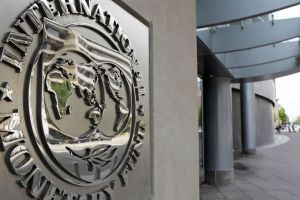Fragstage has increased as financial conditions have hardened, and key vulnerabilities are coming.
The team of economists of the International Monetary Fund (IMF) Headed by Tobias Adrian, who leads the supervision of the financial sector, evaluated that The risks for global financial stability have increased significantlydriven by more restrictive financial conditions and greater commercial and geopolitical uncertainty. According to the study that integrates the last global financial stability report There are three outstanding and prospective vulnerabilities of the financial system.
The content you want to access is exclusive to subscribers.
- First, they point out that capital markets have been increasingly concentrated (for example, the United States represents almost 55% of the world stock market, compared to 30% of two decades ago) and the valuations of some assets remain high despite the recent liquidations. “New corrections in assets prices suggest the need for greater surveillance, given the highly uncertain economic context”they warn.
- Secondly, they consider that non -banking financial institutions (IFNB) have become more active in the channeling of savings towards investment since 2008, and their link with banks has continued to grow. “New massive sales could press some financial institutions, and the consequent disappointment in the sector could exacerbate market turbulence”they hold.
- Thirdly, they realize that sovereign debt levels continue to increase, apparently exceeding the growth of market infrastructure responsible for guaranteeing the proper functioning of the market. “The main public bond markets could experience high volatility, especially in countries with high levels of debt. The most risky emerging markets, whose sovereign bond differentials have increased during recent market turbulence, could have greater difficulties in refinancing their debt or financing additional public spending, ”they estimate.


The big international banks with a central role
Where do IMF experts focus? They are based on the fact that in all the mentioned vulnerabilities Banks play a crucial roleespecially the great international banks that are important market creators in values and derivatives; Important leverage suppliers for various IFNB segments, with the ability to provide directly against asset portfolios, through credit lines, or facilitate leverage indirectly by resting and derivatives. Although, banks of global systemic importance (G-SIB) and other leverage suppliers use tools to protect the bankruptcy risk of an IFNB entity, including guarantee requirements and agreements to reduce gross exposure, they cannot control the amount that a client requested in another place. Consequently, The connection between banks and IFNB has increased in recent years; For example, in the US, IFNB loans have reached 120% of ordinary level 1 of the banks ”they point out.
Therefore, excessive growth based on indebtedness with traditional banking can cause both types of lenders to be more susceptible to possible risks of contagion, which could lead to disappointment, in which they sell assets in a downward market, which in turn generates losses for banks that provided them with their leverage. They also emphasize the growth of private credit and the influence of banking in debtor companies. “Given the forecast of a deceleration of world growth, the borrowers’ ability to deteriorate, which would generate losses for both private credit funds and associated banks.”
IMF says that central banks could continue to lower rates

The IMF warned of outstanding and prospective vulnerabilities of the financial system.
The debt is also increasing in a very different sector: the public. “The sovereign debt now represents 93% of the world GDP, compared to 78% of a decade agoand financing costs have increased both in nominal and real terms. Since government bonds are fundamental instruments in capital markets, disturbances in this market could be a threat to financial stability. ”
Therefore, The fiscal consolidation that promotes growth is key to mitigating this risk.
Another crucial aspect is guarantee that the market maintains its liquidity and proper functioning: In advanced economies, this resilience depends on governments to moderate large bond emissions, on the one hand, and that stock agents, both banking and non -banking, have the ability to intermediate in them, on the other. In emerging markets, the credibility of debt management frameworks is essential. This means that it will be essential to strengthen the ability of institutions, have clear objectives and strategies for the issuance and reimbursement of bonds, and carefully calibrate the monetary composition of the bonds.
What are the main policy recommendations?
- The improvement of information requirements should help supervisors to develop a systemic vision of their activities already discern between those that offer useful financial intermediation and those that assume excessive or poorly managed risk. It is crucial to strengthen the policies that mitigate vulnerabilities related to leverage and interconnection, based on the minimum standards or recommendations of the Financial Stability Council and other regulatory bodies.
- Banks, as the basis of the system, must be resilient to adverse disturbances, including those derived from their growing interconnections with non -banking entities. The full, timely and consistent implementation of Basel III and other bank regulatory standards Internationally agreed, it would guarantee equal conditions in all jurisdictions and a wide and adequate capital and liquidity. The exposure of the banks to the IFNB must be managed prudence.
- Given the increase in sovereign debt levels, the resilience of the operation of the bond market can be strengthened through policies that promote centralized bond compensation and the reduction of counterpart risks, while reinforcing the resilience of said compensation. Also It is important to ensure that key intermediaries in public bond markets are solid and resilient from the operational point of view.
- In the case of emerging markets, the creation of credible frameworks to meet public financing needs can strengthen bond markets. Other useful tools include the medium -term debt management strategies of the IMF and the World Bank for the renewal of debt and the evaluation of its monetary composition and the cost of financing. Emerging economies could also consider the possibility of developing internal government bond markets, since the greatest demand for bonds by national long -term investors has contributed to containing financing costs and external pressures in recent years.
Source: Ambito
I am a 24-year-old writer and journalist who has been working in the news industry for the past two years. I write primarily about market news, so if you’re looking for insights into what’s going on in the stock market or economic indicators, you’ve come to the right place. I also dabble in writing articles on lifestyle trends and pop culture news.




